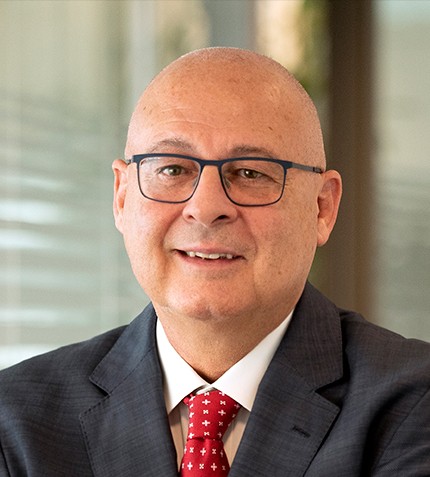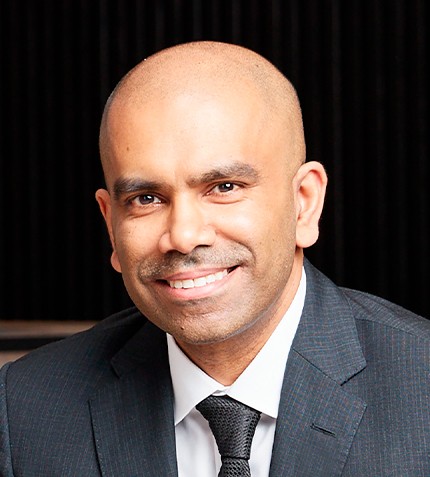
"Our knowhow was enriched with new mining projects for gold and other minerals like bauxite and iron, from the prospection authorization to the exploration permit and the negotiation of the exploitation permit, including the issues in relation with the environmental and social impact of the project, the compensation for lands occupation and taxes during the investment and the operating phase."
RELATED PUBLICATION
ARTICLES FROM THIS PUBLICATION
Kouamé Klemet-N’Guessan
PARTNER, KSK AVOCATS
Can you give an overview of KSK Avocats and its services?
Established in 2008, we grew from a team of three lawyers to one of eighteen experienced lawyers. We are now one of the biggest law firms in Côte d’Ivoire. We offer services to governmental bodies and various industries such as banking, energy and mining. In mining, two of our partners have strengthened and developed an expertise over the years in assisting Equigold NL, the first mining company which held an exploitation permit for gold in Côte d’Ivoire, and all the successive buyers (LGL, Newcrest Mining, Allied Gold) of the shares of the local subsidiary in Côte d’Ivoire. Since then, our knowhow was enriched with new mining projects for gold and other minerals like bauxite and iron developed by other companies, from the prospection authorization to the exploration permit and the negotiation of the exploitation permit including the issues in relation with the environmental and social impact of the project, the compensation for lands occupation and taxes during the investment and the operating phase.
What is the process of obtaining mining rights and how long does it usually take to obtain them?
With regards to the exploration permit and the exploitation permit, the mining administration has a legal obligation to issue these titles in 90 days. In practice, this delay is much longer and the applicant has no means to speed up the process.
All these titles are granted by issuing a license. However, in addition to this license, a mining agreement is signed by the government and the holder of an exploitation permit to clarify the legal and tax status of the operations.
What is the duration of those rights?
The exploration permit is valid for 4 years as from its date of allocation. It may be renewed twice for successive period of 3 years subject to the acknowledgement that the permit holder has financed and carried out the exploration works program presented in support of its permit application as agreed with the mining administration. An exceptional renewal may be granted for a period not longer than 2 years. The exploitation permit is granted for the life of the mine as indicated in the feasibility study being understood that the initial period of validity shall not exceed 20 years. It shall be renewable for successive periods not exceeding 10 years being understood that the mining agreements that are attached to the operating license are valid for 12 years renewable twice. Lastly, the validity of the prospection authorization is one year maximum, renewable exceptionally on conditions provided by a decree.
What restrictions are imposed on the transfer of funds into and out of the country?
There is no, as such, restrictions imposed on the transfer of fund into or out of the country. However, transferring funds into the country for investments or financing is subject to a declaration of investments (for statistical purposes) following the foreign exchanges rules. In addition, this initial declaration aims to ease and avoid any eventual questioning on transferring back any interests, profits or incomes deriving from the investments or financing.
Are there any tax incentives available to mining companies?
Tax incentives are different depending on whether the beneficiary holds an exploration or an exploitation permit. Relating to holders of exploration permits, we can mention exemptions from VAT and customs duty for machinery, materials, machines and equipment included in the approved exploration and needed to implement the exploration program imported by the holder of the exploration permit and its sub-contractors. This exemption also concerns spare parts for exploration machines and equipment.
For holders of an exploitation permit, various exemptions are provided in relation to corporate tax income, property taxes, registration duties on contributions made upon incorporation or capital increase of companies, customs duties due and payable on liquid or gaseous fuels, lubricants, chemical or organic products needed to treat the ore during the entire exploitation period of the mine, etc.
Ivory Coast is fairly stable at the moment, but next year’s elections are already making businesses less confident. What is your view on the possible upcoming instability and its impact on investment?
Investors are cautious and political instability makes them risk averse to some extent. However, I believe in the mining industry specifically the impact of the elections will not be problematic, in particular for companies already operating in Côte d’Ivoire. The recent history has shown that this country has the capacity to overcome its political crisis and get back to work as quickly as possible. My fears for the industry are completely different. These fears are in relation to judgments in compensation disputes rendered by courts ordering operating companies to pay huge amounts of money to individuals. Indeed, such judgments could set dangerous precedents for the security of investments in this industry. I hope that the recent establishment of a Mineral Commission in charge of compensation disputes will contribute to make proper decisions in these cases. However, I understand that it may decrease the likelihood of companies wishing to operate here.
What are your future plans for KSK Avocats?
We aim to maintain our reputation which is based on a relationship of trust between us and our clients. We believe we have a good position in the market at the moment especially as we grow rapidly. We are working on strategic partnerships with local and international companies which should be finalized by 2020.











